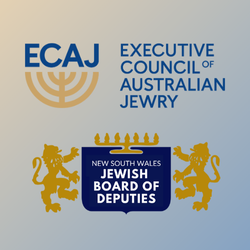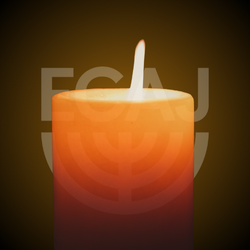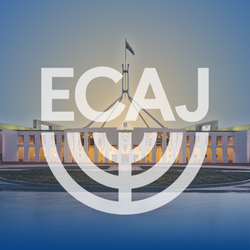This opinion piece by ECAJ co-CEO Alex Ryvchin was originally published in the Australian.
When Nobel Peace Prize laureate Elie Wiesel was a prisoner in Auschwitz, he observed a curious scene. One night, three fellow prisoners, rabbis, had decided to put God on trial for what he had done or allowed to be done to the Jewish people. Wiesel eventually would turn the event into a play, The Trial of God, on the same theme but set in a Polish village ravaged by a pogrom, an anti-Semitic mob rampage of rape, destruction and murder.
In the play, the character prosecuting God accuses the Almighty of “hostility, cruelty and indifference” for allowing such horrors to occur: “Either He knows what’s happening to us, or He doesn’t wish to know! In both cases He is guilty.”
The rabbis Wiesel observed in Auschwitz reached much the same conclusion: guilty. Then they returned to prayer.
October 7, similarly, rocked the faith of the Jewish people. It wasn’t so much a loss of faith in God this time but of Israel’s role as guarantor of Jewish survival, and of the world’s ability to look at an image of two men mirthfully dragging a terrified young woman into captivity and distinguish victim from aggressor, good from evil. Faith in Israel has been restored by the valour and ingenuity of its people. Faith in humanity will take a little longer.
But, as with the horrors Wiesel observed and wrote of, the trauma has stayed with us.
The Jewish people are masters of facing trauma and emerging on the other side of it. In Jewish law, the bereaved are obligated to sit shiva for seven days after the loss of a loved one. They cease work, disconnect from the outside world, cover their mirrors to avoid vanity, sit on low seats and just grieve. The ritual forces one to truly confront one’s loss, stare at it, interrogate it, because the worst thing would be to carry on as though nothing had happened.
At the end of the seven days, the mourner is obligated to terminate the period of intense mourning and stand up. The standing up is often the hardest part. After one year, all signs of mourning must cease and the bereaved is required to live fully again.
October 7 last year was a day of destruction that Jews will commemorate forever to remind us of the existence of evil and what happens when you allow a diabolic foe to entrench himself on your doorstep, plotting against you in plain sight. This generation of Jews will feel a duty to remember the names of the slain and abducted, and to tell their stories.
Stories, we have learned, are far more potent than numbers, which simply overwhelm. The story of the elderly vacationers bound for the Dead Sea posing merrily at a bus stop in one photo, then photographed minutes later lying in a pool of blood. The stripped and broken body of Shani Louk being struck and spat on as she was paraded through the streets of Gaza in the back of a pickup truck, held in place under the boot of a Hamas terrorist, as if to show ownership.
Naama Levy, with bloodied trackies, being led by her hair into a Hamas vehicle. The testimonies of first responders who tended to piles of corpses and restored dignity to the remains of those whose lives ended in sexual torture. A boy of no more than three or four, squirming in fear and isolation, being poked and taunted by Gazan children. A migrant worker having his head hacked off with a shovel. The ecstasy etched on the faces of the Gazans as they praised their conception of God.
As we consumed these images, Jews in Australia and around the world were overcome by two sensations. A physical experience, a sickness and breathlessness as though our own lives were in danger, a feeling similar to having a great weight placed on one’s chest. And a metaphysical experience that transported us to the scenes of Wiesel’s play and the episode that inspired it.
We heard the Hamas terrorists give the same ribald cackles as the sadists that filled our family stories. And we saw on the faces of the victims the same resignation that was etched in black-and-white photographs of those who knelt on the verge of ravines and forest pits a second before the bullet struck.
What has made this year particularly challenging is that we were afforded no time to sit and mourn. There were hostages to fight for, pack rapists and cold-blooded killers to hunt, our local community to protect from the assembled hordes in our cities who praised our violation as their “day of pride”, our rape and mutilation as their “day of courage”.
But on Monday, on the first anniversary of that day, we are compelled to remember but also to end our mourning. That means deepening our contributions to society, not withdrawing. It means working with our fellow Australians to ensure the ethics derived from our faith that have enriched Western culture are preserved and enhanced. And it means to be strong and of good courage in the fight against terrorism, as the Israelis have amply demonstrated. The time to sit in sorrow has now passed. Now we are required to stand up.





